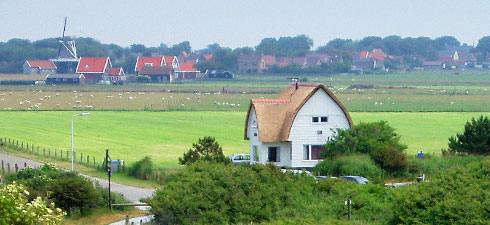Under normal circumstances, there is not very much to say about hydrogen. But on Ameland, one of the Wadden islands off the north coast of the Netherlands, hydrogen is an increasingly popular subject for conversation. Locals are actively participating in an experiment, which blends hydrogen, a gas that burns without producing CO2, with natural gas. The larger the quantity of hydrogen used, the lower the green house gas emissions. According to project manager, Albert van der Meer, a lot of scientific studies have been published about the blend, but tests in a real environment had yet to be conducted.
Van der Meer, who works for the Energy company Eneco, opens the door to one of the green hydrogen tanks. "Bear in mind that this hydrogen was produced in a sustainable way. Better still, the electricity required was generated by solar panels. Our installation has been running since late 2007, we are already using a 15% hydrogen blend, and we'll be able to increase that to a 20% blend with no trouble."
The test installation on the Island of Ameland includes cookers and boilers located in 14 dwellings across the road from the green hydrogens tanks. This small housing complex, which has been disconnected from the natural gas grid, is now linked to the tanks via a special pipe system.
Wim van Hijum sits back with a cup of coffee in his sun filled garden. One of the locals participating in the experiment, he is pleased with the results from the new gas. "You have to live in the modern world," he tells us. "They come around regularly to check on everything, but I haven't had any problems.” Inside his house, he shows us the kitchen. "Can't see any difference, can you?" A small detector has been hung on the wall to make sure there are no emissions of unwanted gas inside the house. “If you cook a wine sauce, the alarm goes off," Van Hijum says, "It's sensitive to alcohol.” According to the Eneco spokeswoman, Saskia Streekstra, the analyzer, which reacts to methanol in the alcohol, "is a super sensitive device."
In the course of the conversation, Van Hijum is surprisingly enthusiastic, "the natural gas and hydrogen blend cooks food faster. Eggs and potatoes take much less time. It's like using a pressure cooker.”
The hydrogen experiment, which is jointly conducted by Eneco and the gas distributor Gasterra, is part of a wider Sustainable Ameland Programme, which aims to make Ameland self sufficient in energy and water by 2020. Recently, five high-efficiency boilers were installed in the island's community centres, each of them equipped with a small motor that transforms residual heat into electricity. Between now and the end of the year, Eneco intends to install this type of boiler in 25 rental homes belonging to the Ameland Housing Corporation, and 75 private homeowners will also be invited to install the new boilers in different types of properties. In a parallel initiative, the programme managers are also studying the possibility of setting up a bio-fermenter that could be used to create green gas from waste and other residue that would then be fed back into the network.
"All of the Wadden islands aim to be wholly sustainable by 2020. But Ameland has a head start," says Sicco Boorsma, manager of the Wadden Islands sustainability project. "Ameland has long-standing links with the major gas companies, because there is gas under and around the island."
From the outset, the population has been actively involved in the experiments and projects. "It was one of our conditions," says Nico Oud, the local councillor responsible for the Environment. "The discussions on other plans are going well. For example on the subject of wind turbines, people are worried about visual pollution, and the negative effect they might have on tourism. So we are looking at smaller turbines, even though they have lower yields. The same applies to solar panels: we can't set them up everywhere, because we are dealing with protected natural sites. Our business owners also have an input on this. Hotels with heat pumps and LED lights, swimming pools where the water temperature is used to generate electricity. It's very interesting to see."
Manager of the Wadden project Sicco Boorsma observes the same enthusiasm on the other islands. "It's a concept that corresponds to the islanders' mentality: they like to do things by themselves. Also, the Waddens offer more possibilities for the generation of sustainable energy. We have more sun than the rest of the country, and there is also more wind. We can also take advantage of sea currents and wave energy.”
Was this article useful? If so we are delighted!
It is freely available because we believe that the right to free and independent information is essential for democracy. But this right is not guaranteed forever, and independence comes at a cost. We need your support in order to continue publishing independent, multilingual news for all Europeans.
Discover our subscription offers and their exclusive benefits and become a member of our community now!












